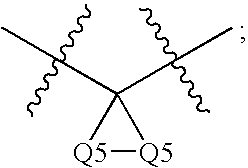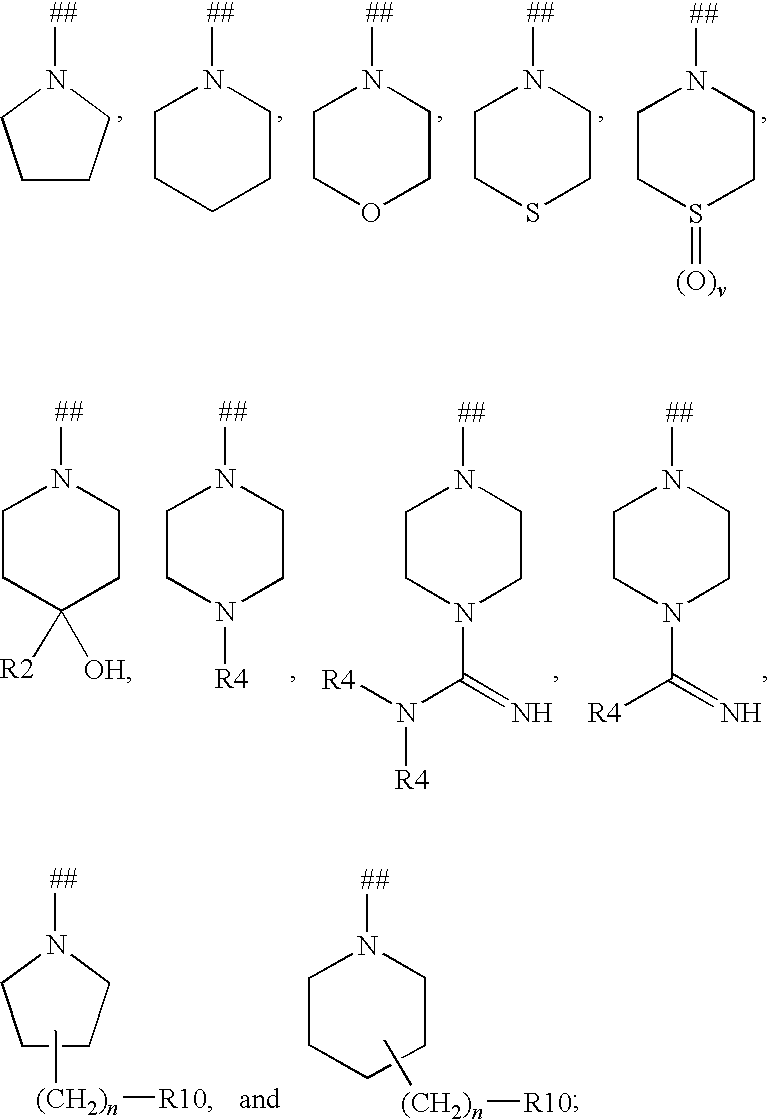N-acyl ureas exhibiting anti-cancer and anti-proliferative activities
a technology of nacyl urea and anti-cancer activity, applied in the field of new drugs, can solve the problems of elusive molecularly targeted small drugs targeting c-kit secondary mutations
- Summary
- Abstract
- Description
- Claims
- Application Information
AI Technical Summary
Benefits of technology
Problems solved by technology
Method used
Image
Examples
example a1
[0238]A suspension of 3-fluoro-4-aminophenol (8.0 g, 63.0 mmol) in dimethylacetamide (80 mL) was de-gassed in vacuo and treated with potassium tert-butoxide (7.3 g, 65 mmol). The resultant mixture was stirred at RT for 30 min. 2,4-Dichloropyridine (8 g, 54 mmol) was added and the mixture was heated to 80° C. for 12 h. The solvent was removed under reduced pressure to give a residue which was partitioned between water and EtOAc (3×100 mL). The organic layers were washed with saturated brine, dried (MgSO4), concentrated in vacuo and purified by silica gel column chromatography to give 4-(2-chloropyridin-4-yloxy)-2-fluorobenzenamine (11 g, 86% yield). 1H NMR (300 MHz, DMSO-d6): δ 8.24 (d, J=5.7 Hz, 1H), 7.00 (dd, J=9.0, 2.7 Hz, 1H), 6.89-6.73 (m, 4H), 5.21 (br s, 2H); MS (ESI) m / z: 239.2 (M+H+).
[0239]A solution of 4-(2-chloropyridin-4-yloxy)-2-fluorobenzenamine (3 g, 12.6 mmol), 1-methyl-3-(4,4,5,5-tetramethyl-[1,3,2]dioxaborolan-2-yl)-1H-pyrazole (5.2 g, 25.2 mmol), and Na2CO3 (2.7 g,...
example a2
[0240]Using a procedure analogous to Example A1, 2-fluoro-4-aminophenol (2.6 g, 24 mmol) and 2,4-dichloropyridine (2.88 g, 20 mol) were combined to provide 4-(2-chloropyridin-4-yloxy)-3-fluoroaniline (3.2 g, 67% yield). 1H NMR (400 MHz, DMSO-d6): δ 8.25 (d, J=5.6 Hz, 1H), 6.99 (m, 1H), 6.90 (m, 2H), 6.50 (d, J=1.6 Hz, 1H), 6.41 (d, J=10.4 Hz, 1H), 5.51 (s, 2H); MS (ESI) m / z: 239.1 (M+H+).
[0241]Using a procedure analogous to Example A1, 4-(2-chloropyridin-4-yloxy)-3-fluoroaniline (3 g, 11.6 mmol), 1-methyl-4-(4,4,5,5-tetramethyl-1,3,2-dioxaborolan-2-yl)-1H-pyrazole (3.4 g, 16.4 mmol), Na2CO3 (2.7 g, 25.2 mmol) and Pd(Ph3)4 (1.5 g, 0.1 eq) were combined to give 3-fluoro-4-(2-(1-methyl-1H-pyrazol-4-yl)pyridin-4-yloxy)aniline (1.1 g, 34% yield). 1H NMR (400 MHz, DMSO-d6): δ (8.31 (d, J=5.6 Hz, 1H), 8.22 (s, 1H), 7.93 (s, 1H), 7.14 (s, 1H), 6.98 (m, 1H), 6.55-6.49 (m, 2H), 6.42 (d, J=7.2 Hz, 1H), 5.44 (s, 2H), 3.86 (s, 3H); MS (ESI) m / z: (M+H+): 285.2.
example a3
[0242]1,2,3-Trifluoro-4-nitrobenzene (30 g, 0.17 mol), benzyl alcohol (18.4 g, 0.17 mol) and K2CO3 (35 g, 0.25 mol) were combined in DMF (300 mL) and were stirred at RT for 8 h. Water (300 mL) was added, and the mixture was extracted with EtOAc (3×500 mL). The combined organic layers were washed with brine, dried (MgSO4), concentrated in vacuo and purified by column chromatography on silica gel to give 1-benzyloxy-2,3-difluoro-4-nitrobenzene (16 g, 36% yield). 1H NMR (400 MHz, DMSO-d6): δ 8.06 (m, 1H), 7.49-7.30 (m, 6H), 5.37 (s, 2H).
[0243]A solution of 1-benzyloxy-2,3-difluoro-4-nitrobenzene (14 g, 52.8 mmol) in MeOH (200 mL) was stirred with Pd / C (10%, 1.4 g, 1.3 mmol) under a hydrogen atmosphere (30 psi) for 2 h. The catalyst was removed by filtration, and the filtrate was concentrated in vacuo to afford 4-amino-2,3-difluorophenol (7 g, 92% yield). 1H NMR (400 MHz, DMSO-d6): δ 9.05 (s, 1H), 6.45 (t, J=8.8 Hz, 1H), 6.34 (t, J=9.2 Hz, 1H), 4.67 (s, 2H); MS (ESI) m / z: 146.1 [M+H]+.
[...
PUM
| Property | Measurement | Unit |
|---|---|---|
| temperature | aaaaa | aaaaa |
| temperature | aaaaa | aaaaa |
| temperature | aaaaa | aaaaa |
Abstract
Description
Claims
Application Information
 Login to View More
Login to View More - R&D
- Intellectual Property
- Life Sciences
- Materials
- Tech Scout
- Unparalleled Data Quality
- Higher Quality Content
- 60% Fewer Hallucinations
Browse by: Latest US Patents, China's latest patents, Technical Efficacy Thesaurus, Application Domain, Technology Topic, Popular Technical Reports.
© 2025 PatSnap. All rights reserved.Legal|Privacy policy|Modern Slavery Act Transparency Statement|Sitemap|About US| Contact US: help@patsnap.com



